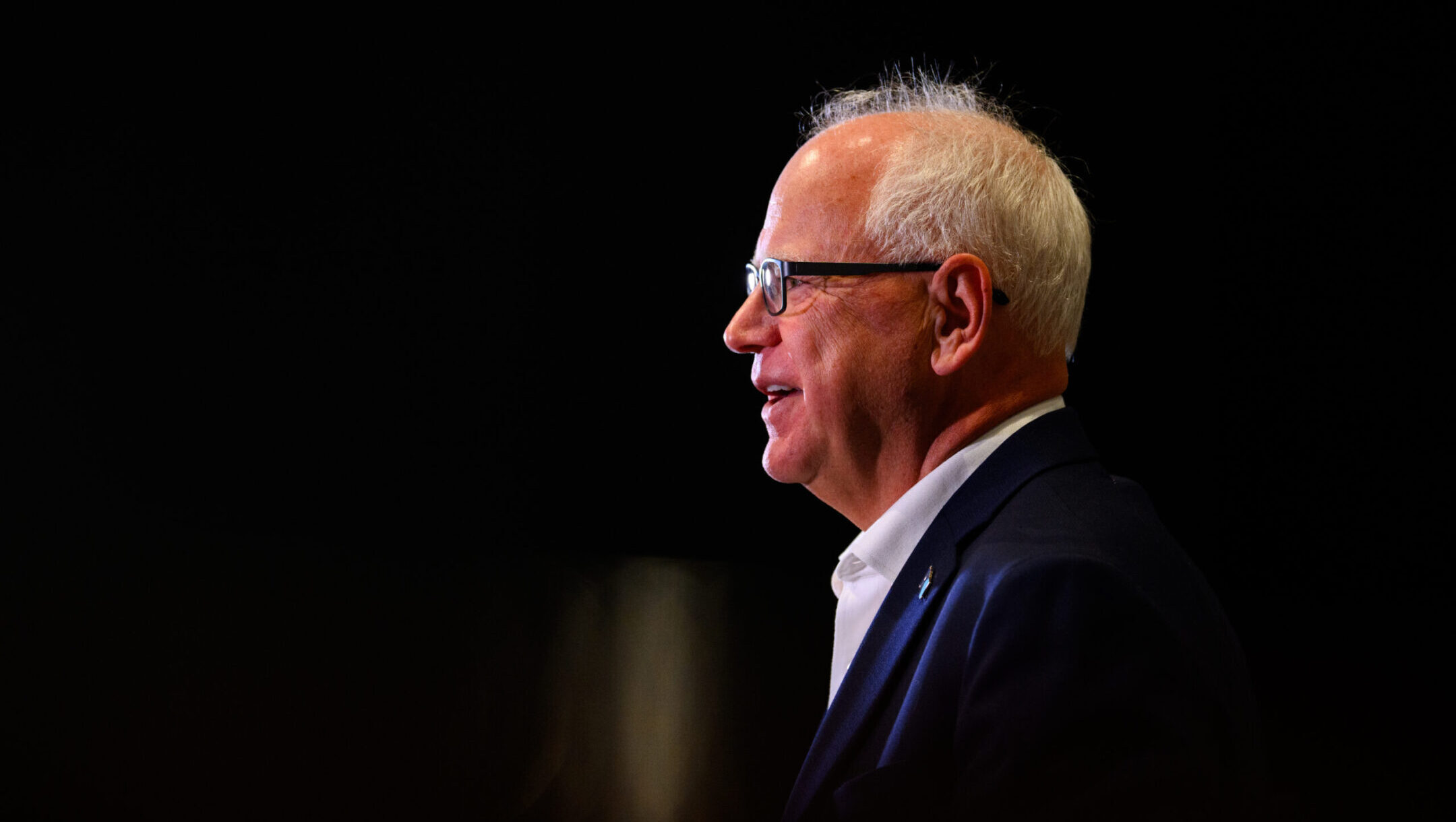Harris veepstakes watch: Tim Walz’s record on Israel, Holocaust education and antisemitism
Walz’s backers say he would be a strong running mate because of his folksy manner, popularity in a Midwestern battleground state and many friends in Congress

Minnesota Gov. Tim Walz speaks during a press conference regarding new gun legislation at City Hall in Bloomington, Minnesota, Aug. 1, 2024. (Stephen Maturen/Getty Images)
(JTA) — Minnesota Gov. Tim Walz, who has a reputation as an unassuming politician, didn’t immediately vault into headlines as a potential vice presidential pick for Kamala Harris.
But Walz has rocketed higher in the veepstakes this week because of his viral criticism of “weird” Republicans — and as another contender, Pennsylvania Gov. Josh Shapiro, takes heat over his stance on Israel, school vouchers and other issues.
Walz’s backers say he would be a strong running mate because of his folksy manner, popularity in a Midwestern battleground state and many friends in Congress, where he was named freshman class president after being elected in 2006. He served there until 2019, when he was sworn in as Minnesota’s governor. He was reelected in 2022 and has steered Minnesota toward liberal policies including guaranteeing abortion rights, requiring paid family leave and incentivizing affordable housing.
Harris has said she will announce her choice before a rally in Philadelphia on Tuesday. The location, and other hints, have suggested to some that Shapiro may be the ultimate choice. But Shapiro has faced fierce pushback from the pro-Palestinian wing of his party, who have dubbed him “genocide Josh” due to his support for Israel amid its war in Gaza, and his condemnations of campus antisemitism at pro-Palestinian protests.
Many of Shapiro’s defenders have noted that the other contenders have pro-Israel records, and that the focus on Shapiro — including the “genocide” epithet — is antisemitic.
“Every potential nominee for Vice President is pro-Israel,” tweeted New York Rep. Ritchie Torres, an outspoken pro-Israel Democrat. “Yet only one, Josh Shapiro, has been singled out by a far-left smear campaign calling him ‘Genocide Josh.’ The reason he is treated differently from the rest? Antisemitism.”
Walz, 60, a former educator and U.S. Army National Guard veteran, traveled to Israel on a 2009 diplomatic trip to the Middle East during which he met with both Israeli Prime Minister Benjamin Netanyahu and Syrian President Bashar al-Asad. In Congress, he voted with the party to allocate foreign aid, including to Israel, and to back the 2015 Iran nuclear deal, which was reviled by Israel and its fiercest allies but supported by most Democrats in Congress.
After Hamas’ Oct. 7 attack on Israel, Walz ordered flags in the state to be flown at half-mast, and criticized both the attack and those who chose not to condemn it.
“If you did not find moral clarity on Saturday morning, and you find yourself waiting to think about what you needed to say, you need to reevaluate where you’re at,” Walz said at a vigil held at Congregation Beth El in suburban Minneapolis, according to TC Jewfolk’s report from the event.
“What was evident on Saturday morning was the absolute lack of humanity, the terrorism and the barbarism,” Walz said. “That’s not a geopolitical discussion. That’s murder.”
Since then, however, he has not been an especially prominent voice in debates over Israel, and he has indicated tolerance of those who want to see the Democratic Party dial down its support for the war against Hamas in Gaza.
This spring, when more than 18% of Minnesota voters cast “uncommitted” Democratic primary ballots to protest President Joe Biden’s support for Israel, Walz said the criticism should not be dismissed out of hand.
“We’ve got eight months. We’ve got to bring these people back in and listen to what they’re saying,” Walz said at the time. “Take them seriously. Their message is clear, that they think this is an intolerable situation and we can do more, and I think the president is hearing that.”
Walz did not suggest that he agreed with the protest voters, and in April, he condemned hostility toward Jewish students at campus protests against Israel while expressing sympathy for the protesters’ messages on Gaza.
“I think when Jewish students are telling us they feel unsafe in that, we need to believe them, and I do believe them,” he said on a local PBS program. “Creating a space where political dissent or political rallying can happen is one thing. Intimidation is another.”
He added, “All of us agree the situation in Gaza is intolerable. What happened on Oct. 7 was intolerable.”
According to TC Jewfolk, Walz spoke in June at an annual event held by Minnesota’s Jewish Community Relations Council where he called for strengthening Holocaust education and ethnic studies in Minnesota schools. (Holocaust education typically draws bipartisan support, while Republicans tend to oppose ethnic studies requirements, which some Jewish groups have also criticized for dismissing or downplaying Jewish identity.)
“Having been in that space at Beth El and just feeling trauma that could blot out the sun, there is still that sense of community, that sense of purpose,” Walz said. “It is important that this is a resilient community. But resiliency isn’t enough. We don’t want to have to be resilient, we’d like these things to be prevented.”
The Holocaust had come up in Walz’s political career before: In 2022, he denounced comments by his Republican opponent comparing his pandemic policies to the Holocaust as “hurtful and dangerous.”
His tone in that circumstance foreshadowed his role this week as an attack dog for Democrats as they seek to swing momentum toward Harris and away from the Republican presidential nominee, former president Donald Trump.
Since Walz first criticized Trump and his vice presidential choice, J.D. Vance, as “weird” last week during an event organized by the Harris campaign, the epithet has caught on in the party, with Harris herself deploying it and analysts saying it appears to be playing well with voters.
Walz used another epithet in the same sentence, one that could easily catch the ear of anyone steeped in Jewish history.
“The fascists depend on us going back, but we’re not afraid of weird people,” Walz said. “We’re a little bit creeped out, but we’re not afraid.”
A message from our Publisher & CEO Rachel Fishman Feddersen

I hope you appreciated this article. Before you go, I’d like to ask you to please support the Forward’s award-winning, nonprofit journalism during this critical time.
We’ve set a goal to raise $260,000 by December 31. That’s an ambitious goal, but one that will give us the resources we need to invest in the high quality news, opinion, analysis and cultural coverage that isn’t available anywhere else.
If you feel inspired to make an impact, now is the time to give something back. Join us as a member at your most generous level.
— Rachel Fishman Feddersen, Publisher and CEO






















